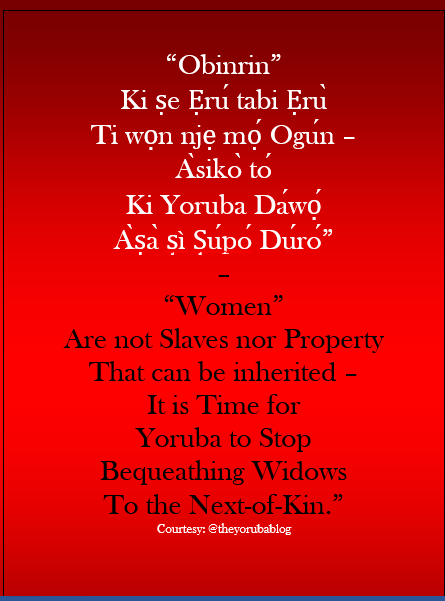Ni ayé àtijọ́, àṣà ṣì ṣúpó wọ́pọ̀ ni Ilẹ̀ Yorùbá. Obinrin ti ọkọ rẹ̀ bá kú wọn yio fi jogún gẹ́gẹ́ bi iyàwó fún ọmọ ọkọ ọkùnrin tàbi ẹbi ọkọ ọkùnrin. Eleyi wọ́pọ̀, pàtàki ni idilé Ọba, Ìjòyè nla, Ọlọ́rọ̀ ni àwùjọ àti àgbàlagbà ti ó fẹ́ iyàwó púpọ̀. Bi Ọba bá wàjà, Ọba titun yio ṣu gbogbo iyàwó ti ó bá láàfin lópó.
Ni ayé ọ̀làjú ti òde òni, àṣà ṣì ṣúpó ti din kù púpọ̀, nitori ẹ̀sìn àti àwọn obinrin ti ó kàwé ti ó si ni iṣẹ́ lọ́wọ́ kò ni gbà ki wọn ṣú ohun lópó fún ẹbi ọkọ ti kò ni ìfẹ́ si. Ọkùnrin ni ẹbi ọkọ na a ti bẹ̀rẹ̀ si kọ àṣà ṣì ṣúpó silẹ̀ pàtàki àwọn ti ó bá kàwé, nitori ó ti lè ni iyàwó tàbi ki ó ni àfẹ́sọ́nà. Lai ti ẹ ni iyàwó, ọkùnrin ẹbi ọkọ lè ma ni ìfẹ́ si iyàwó ti ọkọ rẹ̀ kú. Àṣa ṣì ṣúpó kò wọ́pọ̀ mọ laarin àwọn ti ó jade, àwọn ti ó ngbé ilú nla àti Òkè-òkun tàbi àwọn ti ó kàwé, ṣùgbọ́n ó wọ́pọ̀ laarin àwọn ti kò jade kúrò ni Abúlé àti àwọn ti kò kàwé.
Idilé ti ifẹ bá wà laarin ẹbi, iyàwó pàápàá kò ni fẹ́ kúrò ni irú ẹbi bẹ́ ẹ̀ lati lọ fẹ́ ọkọ si idilé miran pàtàki nitori àwọn ọmọ tàbi ó dàgbà jù lati tun lọ fẹ ọkọ miran. Ọmọ ọkọ tàbi ẹbi ọkọ ọkùnrin lè fi àṣà yi kẹ́wọ́ lati fẹ opó ni tipátipá, omiran lè pa ọkọ lati lè jogún iyàwó. Bi iyàwó bá kú, wọn kò jẹ́ fi ọkọ rẹ jogún fún ẹbi iyàwó.
Àsikò tó lati dáwọ́ àṣà ṣì ṣúpó dúró nitori obinrin ki ṣe ẹrú tàbi ẹrù ti wọn njẹ mọ́ ogún.
ENGLISH TRANSLATION
In the olden days, bequeathing widows to the next of kin was a common Yoruba culture. A woman whose husband is dead was bequeathed to her Step-Son or the late husband’s male Next of Kin. This practice was common particularly, among the Kings, High Chiefs, Wealthy men in the Society and older polygamous men. It is customary that if a King passes on, the newly elected King would inherit the wives left in the Palace by the deceased King.
In the modern time, the culture of bequeathing widows has drastically reduced, as a result of Religious beliefs, educated woman with gainful employment would not succumb to being bequeathed to someone she did not love. Even the next of kin are beginning to reject this culture particularly the educated ones who are married or committed. Even without any marital commitment, the next of kin may not be in love with the widow. The culture of bequeathing widows is not common among those who are educated and exposed or those living in larger Towns/Cities or Abroad, but it is still common among those residing in Villages, who lack education and exposure.
Families where there is love, the widow may not want to leave such loving family to marry into an unknown family, particularly because of the children or old age. The Step Son or Next of Kin can use this culture as an excuse to marry the widow by all means, some may even result to killing the husband in order to inherit the wife. If a woman dies, the husband is never bequeathed to her Next of Kin or the ladies in her family.
It is time to stop the practice of bequeathing a woman to the Next of Kin, because women are not slaves or property that can be inherited.
Originally posted 2015-09-18 19:53:23. Republished by Blog Post Promoter



